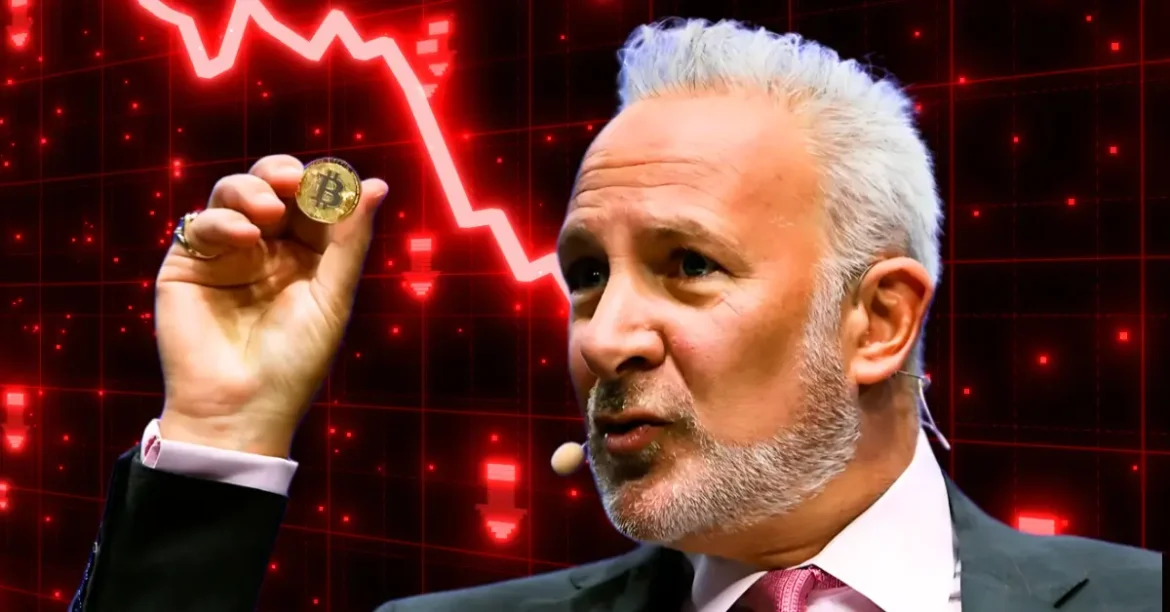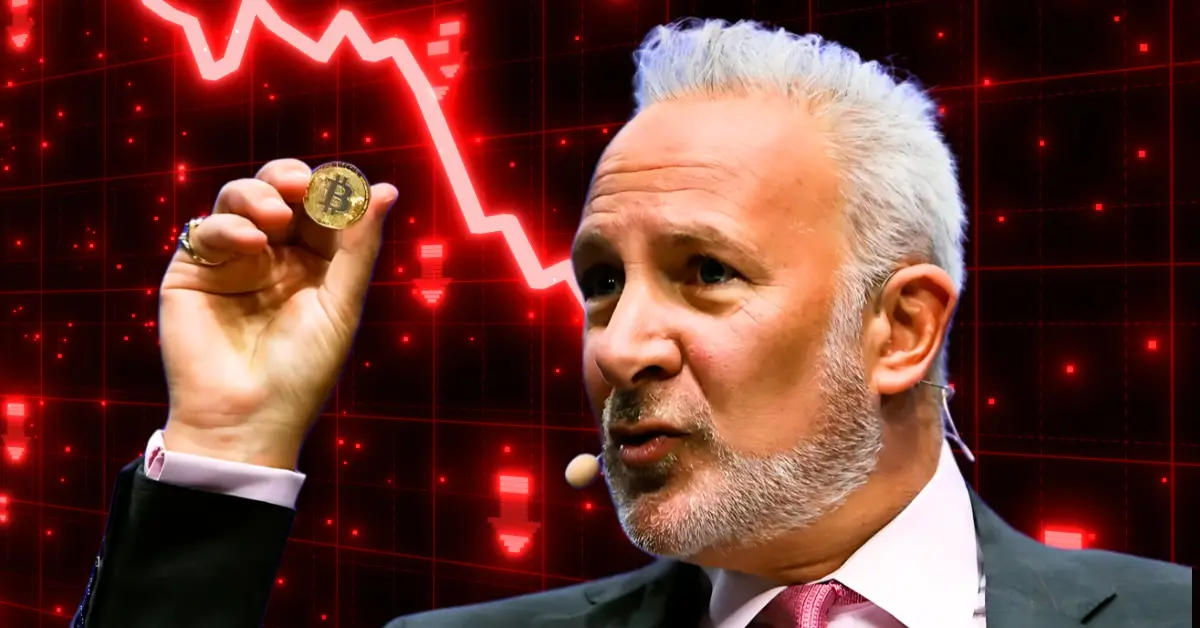The Enduring Critique: Peter Schiff’s Persistent Claims of Bitcoin as a “Decentralized Ponzi Scheme”
Introduction: A Clash of Financial Philosophies
The financial world is no stranger to heated debates, but few have been as persistent or as polarizing as the one between Peter Schiff, a staunch gold advocate, and the proponents of Bitcoin. Schiff, a well-known economist and CEO of Euro Pacific Capital, has consistently labeled Bitcoin a “decentralized Ponzi scheme,” a claim that has sparked intense discussions and counterarguments. His critique is not merely a passing opinion but a deeply rooted belief that shapes his analysis of cryptocurrency-related events, policies, and market trends. To fully grasp the nuances of this debate, it is essential to dissect Schiff’s arguments, explore the counterarguments, and examine the evolving landscape of cryptocurrency.
The Anatomy of Schiff’s Argument
Lack of Intrinsic Value
At the heart of Schiff’s critique is the assertion that Bitcoin lacks intrinsic value. Unlike traditional assets such as gold, real estate, or stocks, Bitcoin is not backed by any tangible asset or productive capacity. Schiff argues that Bitcoin’s price is solely driven by speculation and the expectation of future price increases. This, he contends, resembles a classic Ponzi scheme, where early investors are paid with money from later investors. The absence of underlying value, in his view, makes Bitcoin inherently unstable and prone to collapse.
Decentralization as a Weakness
Ironically, Schiff views Bitcoin’s decentralized nature not as a strength but as a vulnerability. He contends that the absence of a central authority makes Bitcoin susceptible to manipulation and fraud. Without regulatory oversight or a responsible entity to enforce rules, Schiff argues, the system is prone to abuse. This lack of central control, he believes, further solidifies his characterization of Bitcoin as a Ponzi scheme, where the absence of accountability allows for unchecked speculation and potential fraud.
Stablecoins Under Scrutiny
Schiff’s skepticism extends to stablecoins, particularly those pegged to the U.S. dollar. He believes their stability is only as reliable as the dollar itself, which he anticipates will decline in value. From his perspective, stablecoins offer no real advantage and are merely another facet of the larger crypto “house of cards.” He argues that stablecoins are not a solution to the volatility of cryptocurrencies but rather a temporary fix that masks deeper systemic issues.
Legislative Concerns
The recent wave of crypto bills in the U.S. has only intensified Schiff’s criticism. He views these bills as an attempt to falsely legitimize Bitcoin and inflate hype around digital assets. He fears that these legislative efforts will encourage more people to invest in crypto, potentially leading to significant financial losses, especially if investments are encouraged through vehicles like 401Ks. Schiff argues that the lack of regulatory clarity and the potential for market manipulation make crypto investments particularly risky for average investors.
Counter-Arguments and the Evolving Crypto Landscape
While Schiff’s arguments have resonated with some, they face considerable opposition from the crypto community and certain financial analysts. Several counterarguments challenge his core claims.
Scarcity and Utility
Proponents of Bitcoin emphasize its limited supply of 21 million coins, arguing that this scarcity gives it inherent value, akin to precious metals like gold. Furthermore, they point to Bitcoin’s utility as a decentralized, censorship-resistant form of digital money, particularly valuable in countries with unstable financial systems or oppressive regimes. The ability to transfer value across borders without intermediaries is seen as a significant advantage, especially in regions with capital controls or restrictive financial policies.
Technological Innovation
Beyond Bitcoin, the broader crypto ecosystem encompasses a wide range of technologies and applications, including decentralized finance (DeFi), non-fungible tokens (NFTs), and blockchain-based supply chain management systems. These innovations demonstrate the potential of blockchain technology to disrupt traditional industries and create new economic opportunities. The underlying technology, rather than just the speculative value, is seen as a driving force for future economic growth and efficiency.
Maturing Regulatory Environment
While Schiff criticizes the lack of regulation, the regulatory landscape for cryptocurrencies is gradually evolving. Governments worldwide are exploring ways to regulate crypto assets, aiming to balance innovation with investor protection. This growing regulatory framework could address some of Schiff’s concerns about manipulation and fraud. As regulatory clarity improves, the crypto market may become more stable and less prone to the speculative bubbles that Schiff warns against.
Long-Term Value Proposition
Despite market volatility, many believe that Bitcoin has the potential to be a long-term store of value, a hedge against inflation, or a new form of digital gold. They argue that its decentralized nature and limited supply make it an attractive alternative to traditional financial assets. The increasing adoption of Bitcoin by institutional investors and the growing acceptance of crypto as a legitimate asset class further support this perspective.
Examining the “Ponzi Scheme” Accusation
The most provocative aspect of Schiff’s critique is his repeated labeling of Bitcoin as a “Ponzi scheme.” To assess the validity of this claim, it’s essential to understand the characteristics of a Ponzi scheme:
- False Promises: Ponzi schemes typically involve promises of high returns with little or no actual underlying investment or business activity.
- Early Investor Payouts: Early investors are paid with money collected from new investors, creating the illusion of profitability.
- Unsustainable Model: The scheme is inherently unsustainable because it relies on a constant influx of new investors to pay off existing ones.
- Collapse: Eventually, the scheme collapses when the flow of new investors dries up, leaving the vast majority of participants with losses.
While some critics argue that Bitcoin exhibits certain characteristics of a Ponzi scheme, such as reliance on new investors to drive up the price, there are also key differences. Bitcoin is not explicitly promising returns; people aren’t told they will necessarily become rich from buying it. The underlying technology behind Bitcoin serves a purpose, whether people agree it has any value or not. Unlike a Ponzi scheme, Bitcoin’s value is not derived from the promise of future returns but from its utility as a decentralized, digital form of money.
The Role of Market Sentiment and Speculation
It’s undeniable that market sentiment and speculation play a significant role in Bitcoin’s price fluctuations. The crypto market is known for its volatility, with prices often driven by news, social media trends, and investor psychology. This speculative element fuels Schiff’s concerns about a potential bubble and eventual crash. However, it’s important to note that speculation is not unique to cryptocurrencies; it is a common feature of many financial markets, including stocks, real estate, and commodities.
Trump’s Crypto Push
Schiff has been particularly critical of Donald Trump’s recent embrace of cryptocurrency, viewing it as a cynical attempt to manipulate the market and enrich insiders. He suggests that this “crypto pump” could ultimately accelerate the dollar’s collapse and lead to a crash in Bitcoin’s price. Schiff’s concerns highlight the broader political and economic implications of cryptocurrency adoption, particularly in the context of U.S. monetary policy and global financial stability.
Schiff’s Enduring Gold Advocacy
Underlying Schiff’s anti-crypto stance is his unwavering advocacy for gold. He sees gold as the true safe haven asset, a store of value that has stood the test of time. In his view, Bitcoin is a speculative fad that cannot compare to the stability and intrinsic value of gold. Schiff’s advocacy for gold is rooted in his belief in the importance of tangible, physical assets as a hedge against inflation and economic instability.
The Gold vs. Bitcoin Debate
The debate between gold and Bitcoin as a store of value is a recurring theme in financial discussions. Proponents of gold emphasize its long history, physical scarcity, and use in various industries. Bitcoin enthusiasts, on the other hand, highlight its digital scarcity, ease of transfer, and potential as a hedge against inflation. The debate ultimately hinges on the relative merits of physical versus digital assets and the role of government-backed currencies in the global financial system.
The Broader Economic Context
Schiff’s critique of Bitcoin is intertwined with his broader economic views. He is a vocal critic of fiat currencies, government debt, and central bank policies. He believes that the U.S. dollar is on a path to decline and that a major financial crisis is inevitable. Schiff’s predictions of economic doom have often been met with skepticism, and his track record is mixed. However, his concerns about inflation, debt, and financial instability resonate with many investors who are seeking alternative assets like gold and, to a lesser extent, Bitcoin.
Economic Predictions
Schiff’s economic predictions are based on his belief in the unsustainability of current monetary policies. He argues that the excessive money printing and debt accumulation by central banks will inevitably lead to a collapse of the financial system. While his predictions have not yet come to pass, the ongoing debates about inflation, quantitative easing, and the role of central banks highlight the relevance of his concerns. The crypto community, in particular, sees Bitcoin as a potential solution to the problems caused by fiat currencies and central bank policies.
Conclusion: A Matter of Perspective
Peter Schiff’s persistent labeling of Bitcoin as a “decentralized Ponzi scheme” reflects his deeply held beliefs about money, value, and the role of government. While his arguments have some merit, they are not universally accepted, and the crypto community continues to challenge his perspective. Whether Bitcoin ultimately proves to be a revolutionary technology or a speculative bubble remains to be seen. The debate surrounding Bitcoin and its place in the financial world is far from over. As the crypto market evolves, regulatory frameworks develop, and economic conditions change, the arguments for and against Bitcoin will continue to be debated and refined. Peter Schiff’s voice, as a prominent and unwavering critic, will undoubtedly remain a part of this ongoing saga. The enduring critique highlights the broader philosophical and economic divides that shape the future of finance and investment.





